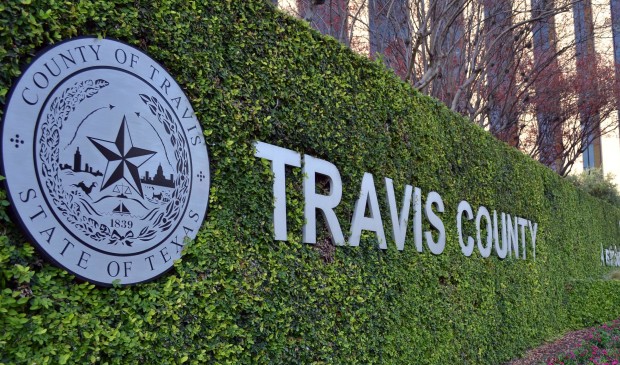Crucial uncertainty remains after Commissioners Court chooses bond projects
Wednesday, August 9, 2017 by
Caleb Pritchard After a morning and afternoon marked by high pique and dudgeon, the Travis County Commissioners Court on Tuesday approved a $280 million slate of transportation, parks and drainage projects to be funded by taxpayer-backed bonds.
The list is split between projects of high urgency and those that can afford to wait for voter approval. The first bucket – worth $95 million – would be funded by certificates of obligation, which can be issued by a majority vote on the court. The remaining $185 million tranche will head to a referendum, though after Tuesday’s discussion, exactly when that would be held is now in question.
During the lengthy and heated discussion – pocked with public testimony, on-dais bickering, interruptions for executive sessions, lunch, and a short break to honor the county’s 2017 class of summer interns – Tina Cannon, the Austin Chamber of Commerce’s senior director of local government relations, once again reminded the court that the Austin Independent School District has already placed on the November ballot a $1.05 billion bond question, a mammoth package that she suggested is likely to draw strong opposition.
“The chamber has been very supportive of the work of the AISD bond and we hope that is successful,” Cannon said. “We also hope that the Travis County bond is in a position to be able to meet the needs of the residents.”
While that may have seemed like friendly boilerplate, Commissioner Gerald Daugherty deduced that it was a suggestion to the court to consider sending its bond referendum to voters next May. County Judge Sarah Eckhardt agreed with that assessment (which Cannon confirmed on Twitter) and opted to hold off on the decision to call the election until next week.
That agreement between Daugherty and Eckhardt was the exception to the rule throughout the discussion. In the early goings, he expressed frustration over a recent update from county staff that work on a youth sports complex in his Precinct 3 would likely not begin until 2020 at the earliest, if voters approve the package.
“I’m saying that people in western Travis County are going to have an extreme issue with that,” Daugherty said, adding that the timeline would make it difficult for him to defend the bond package to his constituents.
Eckhardt attempted to assuage Daugherty by offering to discuss ways to fast-track project implementations in a subsequent discussion. Nevertheless, he persisted, leading an exasperated Eckhardt to tell him, “If you would like to hold the timing of projects as a threat with regard to your vote for other projects, that is at your option, commissioner.”
Daugherty, clearly upset, insisted that he was not making a threat. “First of all,” he said, “I’m not known for threatening. I’m not known for sneaking up on you.” The moment of tension soon slackened and Eckhardt steered the discussion toward public testimony before ultimately breaking for lunch.
Upon resuming the discussion in the afternoon, Commissioner Brigid Shea motioned to approve the $185 million set of projects that represented a modified version of the batch recommended by the Citizens Bond Advisory Committee. Added to the new list is $8.3 million to lay artificial turf on the soccer fields at Northeast Metropolitan Park, as well as an extra $27 million for eight low-water crossings and culverts originally deemed to be of secondary priority by the committee.
Shea’s motion also removed from the list $6.6 million for an expansion of Braker Lane. According to county staff, that project may qualify for funding that could be obtained from the Capital Area Metropolitan Planning Organization. An extra $300,000 for a section of the Walnut Creek Trail that would help connect Austin to Manor was also dropped. However, that money would be earmarked in the 2018 budget’s reserve fund to be used should the opportunity to partner with those communities arise.
Commissioner Jeff Travillion seconded Shea’s motion but, before the vote, Daugherty offered an amendment, a “special caveat,” he said, that would allow “that the prioritization and the implementation and issuance schedules with each precinct should be made by the appropriate precinct commissioner with the assistance of (Transportation and Natural Resources and the Planning and Budget Office).”
Daugherty told his colleagues that he had given up on Reimers-Peacock Road but hoped to reserve the right to move any bond money for projects in his precinct to the extension of Vail Divide, which would also connect State Highway 71 to Hamilton Pool Road, though just west of Bee Cave and through far less undeveloped land.
That request was ultimately denied by Shea, who worried that it might not pass muster with requirements set forth by the Texas Legislature. Ultimately, the court approved her motion, with Daugherty voting against it.
The court’s lone Republican did join his colleagues in unanimously approving Commissioner Margaret Gómez’s motion to approve the list of projects set for funding by certificates of obligation. Among that list is a $29 million widening of Del Valle’s Elroy Road in front of the Circuit of the Americas.
Gómez’s motion added to the recommendations an extra $3.5 million for a project along Pearce Lane.
According to staff, the entire $280 million bond package would add up to an extra $36 per year on the median homeowner’s tax bill. The voter-approved portion would account for $24 of that.
The Austin Monitor’s work is made possible by donations from the community. Though our reporting covers donors from time to time, we are careful to keep business and editorial efforts separate while maintaining transparency. A complete list of donors is available here, and our code of ethics is explained here.
You're a community leader
And we’re honored you look to us for serious, in-depth news. You know a strong community needs local and dedicated watchdog reporting. We’re here for you and that won’t change. Now will you take the powerful next step and support our nonprofit news organization?




